Pork or Friend?
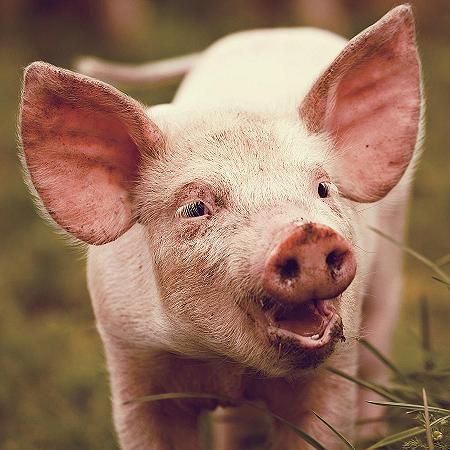
(piglet02.jpg)

(pork02.jpg)

(puppy02.jpg)

Kato, do you like pork steak?

No, I don't.
Then how come you've pasted a picture of pork steak?
Diane, did you read the Metro news on March 27?
Yes, I think I did. Was there an article about pork steak in the papers?
Yes, there was. Diane, you probably noticed the following picture on Page 3.

(why02.jpg)

I think I overlooked the above picture.

So you haven't read the following article, haven't you?

(metro327b.gif)
The Vancouver Humane Society wants you to think about puppies before you put pork on your fork.
New advertisements gracing the back of city buses place a picture of Fido labeled “friend” beside Wilbur labeled “food” to point out the inconsistencies in peoples’ attitudes toward animals, spokesman Peter Fricker said Tuesday.
■"The Actual Article on the Net"
New advertisements gracing the back of city buses place a picture of Fido labeled “friend” beside Wilbur labeled “food” to point out the inconsistencies in peoples’ attitudes toward animals, spokesman Peter Fricker said Tuesday.
■"The Actual Article on the Net"

Ummm... Quite interesting! Yes, piglets and puppies are both adorable. Yet, we treat puppies as friend and label piglets “food,” don't we?

Yes, you're telling me. We're definitely inconsistent in attitudes toward animals, but I don't eat pork.
Why not?
...'Cause the Vancouver Humane Society wants me to think about puppies before I put pork on my fork.
Oh my! ... Kato, do you really mean it?
Kato, get serious! Just tell me why you don't eat pork.
... 'Cause I'm a vegetarian.
Are you really serious?
Kato, don't fool around and waste my time.
Alright, then... I'm serious now. You see, Diane, the traditional Japanese food is based on rice with miso soup and other dishes, each in its own utensil, with an emphasis on seasonal ingredients.


rice with miso soup

The side dishes often consist of fish, pickled vegetables, and vegetables cooked in broth. Fish is quite common in the traditional cuisine. As you know, fish may be served raw as sashimi or in sushi.


Seafood and vegetables are also deep-fried in a light batter as tempura, but the Japanese don't eat a great deal of red meat.

I know, I know ... That's the reason the Japanese tend to live longer. The other day, I watched the 115-year-old Japanese man---the oldest man in recorded history.
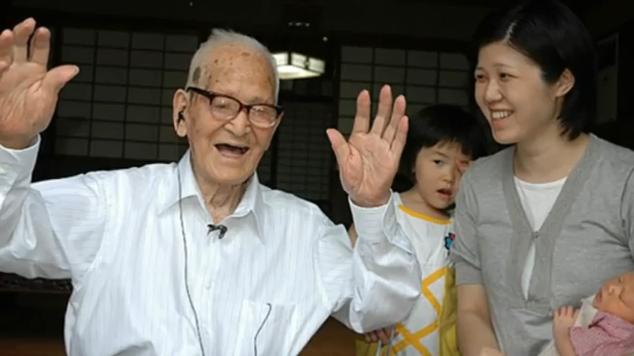
(kimura116.jpg)
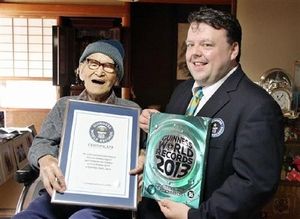
(kimura115.jpg)

So, Kato, are you saying that red meat is really bad for health?

I think so.
You don't eat red meat simply because you want to live up to 100 years, do you?
Well ... if possible, I wanna live that long, but the reason I don't eat read meat is simply because my DNA makes me dislike red meat.
So you don't eat pork and beef, do you?
No, I seldom eat pork and beef.
But, a Japanese friend of mine like beef in “sukiyaki” and “nikujaga.”

(sukiyaki03.jpg)
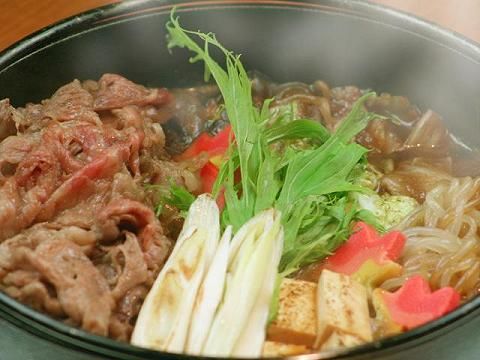
(sukiyaki02.jpg)
“sukiyaki”

I know. Once in a while, I myself eat it. Indeed, some Japanese like pork and beef because they are Westernized, and they tend to die young.

Don't you like pork and beef, Kato?
Well ... Whenever I see pork and beef, the red meat reminds me of the following pictures:
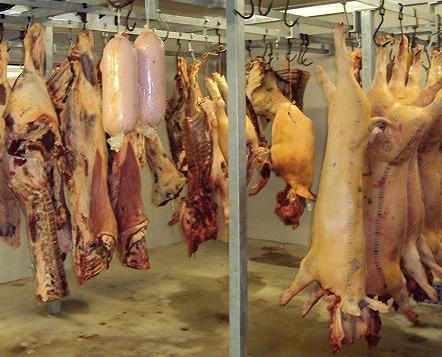
(butchery1.jpg)
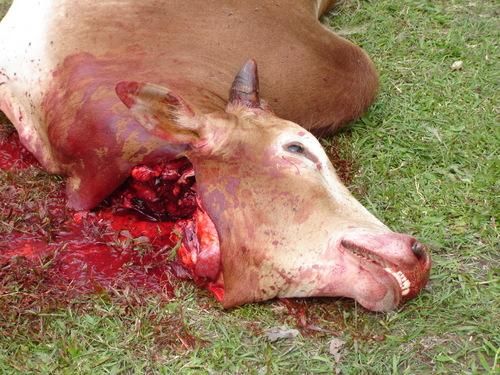
(butchery3.jpg)

(goat02.jpg)

These images scare the hell out of me. Besides, my imagination goes wild and lets me stand in front of the following butchers:

The above butchers certainly scare the shit out of me, and my appitite dies down with those animals.

I think your imagination goes too wild. Don't even think about butchery. Kato, are you saying that Americans, Canadians and Europeans are cruel?
Yes, to a certain extent. I would safely say that most Canadians are inconsistent in attitudes toward animals as the newspaper article points out.
Are you saying that the Orientals are animal-lovers?
Yes, I'd say so.
Since you've said that, let me tell you this. The other night, I watched the following video clip.

Yes, yes, yes, ... I know, but these incidents are happening in China, not in Japan.

Are you saing that the Japanese are nice and kind to dogs and cats?
Yes, of course, we are. Traditionally speaking, if you had killed a dog during the days of Shogun Tsunayoshi, you would have been sentenced to death without a question.
No kidding!
Tokugawa Tsunayoshi (徳川 綱吉)
(February 23, 1646 – February 19, 1709)
He was the fifth shogun of the Tokugawa dynasty of Japan.
He is known for instituting animal protection laws, particularly for dogs.
This earned him the nickname of "Dog shogun."
Owing to religious fundamentalism, Tsunayoshi sought protection for living beings in the later parts of his rule.
In the 1690s and first decade of the 18th century, Tsunayoshi, who was born in the Year of the Dog, thought he should take several measures concerning dogs.
A collection of edicts released daily, known as the Edicts on Compassion for Living Things (生類憐みの令) told the populace, inter alia, to protect dogs, since in Edo there were many stray and diseased dogs walking around the city.
Therefore, he earned the pejorative title "Inu-Kubō (犬公方)."
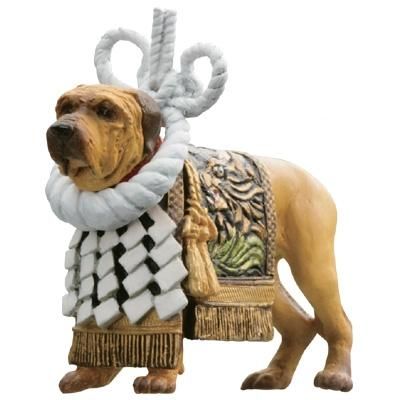
(tosa99.jpg)
In 1695, there were so many dogs that Edo began to smell horribly.
An apprentice was even executed because he wounded a dog.
Finally, the trouble was taken to a distance, as over 50,000 dogs were deported to kennels in the suburbs of the city where they would be housed.
They were apparently fed rice and fish which were at the expense of the taxpaying citizens of Edo.
SOURCE:"Tokugawa Tsunayoshi"
From Wikipedia, the free encyclopedia
(February 23, 1646 – February 19, 1709)
He was the fifth shogun of the Tokugawa dynasty of Japan.
He is known for instituting animal protection laws, particularly for dogs.
This earned him the nickname of "Dog shogun."
Owing to religious fundamentalism, Tsunayoshi sought protection for living beings in the later parts of his rule.
In the 1690s and first decade of the 18th century, Tsunayoshi, who was born in the Year of the Dog, thought he should take several measures concerning dogs.
A collection of edicts released daily, known as the Edicts on Compassion for Living Things (生類憐みの令) told the populace, inter alia, to protect dogs, since in Edo there were many stray and diseased dogs walking around the city.
Therefore, he earned the pejorative title "Inu-Kubō (犬公方)."

(tosa99.jpg)
In 1695, there were so many dogs that Edo began to smell horribly.
An apprentice was even executed because he wounded a dog.
Finally, the trouble was taken to a distance, as over 50,000 dogs were deported to kennels in the suburbs of the city where they would be housed.
They were apparently fed rice and fish which were at the expense of the taxpaying citizens of Edo.
SOURCE:"Tokugawa Tsunayoshi"
From Wikipedia, the free encyclopedia

An apprentice was even executed because he wounded a dog. Unbelievable! So, in those days, life of a dog was valued more than that of a human in Japan, wasn't it?

Yes, you're darn right.
Then the Japanese have been dramatically changed since those days, haven't they?
How do you mean?
Kato, do you like dolphins?
Yes, of course, I do. Dolphins are quite intelligent. Personally, I like dolphins more than dogs.

(dolphin99.jpg)
SeaWorld's Old "Dolphin Discovery" Show (in HD)

I really adore those intelligent creatures. As a matter of fact, dolphins have long played a role in human culture. For example, dolphins are common in Greek mythology and there are many coins from ancient Greece which feature a man or boy or deity riding on the back of a dolphin. The Ancient Greeks welcomed dolphins; spotting dolphins riding in a ship’s wake was considered a good omen.

But, Kato, do you know that the Japanese are slaughteing those dolphins in Japan?
Are you sure about that?
Look at the following video clip.
Story of Dolphin Slaughter in Japan

Yes, yes, yes, ... now I recall those incidents. This place called Taiji (太地町、和歌山県) is quite famous as a whaling town for hundreds of years. The people in Taiji have been hunting whales and dolphins for several centuries. In fact, they spearheaded the development of more sophisticated traditional whaling techniques in the 17th century.

But killing dolphins is extraordinary and inhumane. Don't you think so, Kato?
Yes, yes, yes, ... I agree with you, Diane. So, in 1988, a ruling by the International Whaling Commission (IWC) caused Taiji to suspend commercial whaling. However, the town continues to hunt small whales and dolphins. Taiji's annual dolphin hunt is a subject of controversy and the town faces continued pressure from protest groups. The above clip is obviously made by one of those groups, I suppose.
So, Kato, you know those killing incidents, don't you?
Yes, I do. Whales and dolphins are traditionally considered as food in Japan, and are killed in harpoon or drive hunts. But, generally speaking, the Japanese seldom eat whale or dolphin meat becuse both meats are not so tasty. In fact, I've never eaten dolphin meat in my life.
Why not?
... Simply because you can't find dolphin meat in fish shop nor in sushi restaurant.
So, Kato, you're saying that whale or dolphin meat is eaten mostly in fishing towns like Taiji.
I'd say so. Once or twice I've eaten some whale meat, but I didn't like it. As far as I'm concerned, I've never seen dolphin meat in my life.
So, Kato, you're saying that most Japanese are dolphin-friendly and don't eat dolphin meat at all.
Yes, I'd say so. As I said, I've never eaten dolphin meat at all in my life. The Japanese definitely prefer fish meat like tuna and bonito to mammal meat such as whale and dolphin.
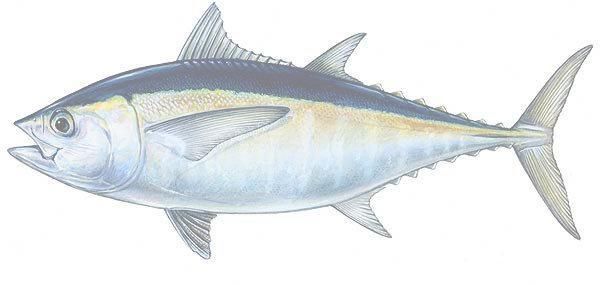
(tuna2.jpg)
Tuna

So, Kato, you're againt eating mammal meat, aren't you?

Personally, I don't like mammal meat. I prefer fish meat, but I wouldn't despise you even if you ate dolphin meat.
Why is that?
Well ... In some cultures, even cannibalism is going on. For example, the Korowai in the western part of New Guinea are one of very few tribes still believed to eat human flesh as a cultural practice. It is also still known to be practiced as a ritual and in war in various Melanesian tribes.
So, Kato, are you saying that such a practice is considered normal in some cultures?
Yes, I am. Even in our civilization, cannibalism has been occasionally practiced as a last resort by people suffering from famine. A famous example is the ill-fated Westward expedition of the Donner Party, and more recently the crash of Uruguayan Air Force Flight 571, after which some survivors ate the bodies of dead passengers.
But, I heard that some people on the plane refused to eat human flesh and chose to die instead.
I don't blame the survivors. Nobody can force others to obey his or her rule.
I see. So, Kato, you're saying that nobody should be celf-centered, aren't you?
Yes, I am. As you always say, Diane, everybody should be open-minded. I hate self-righteous people.
By the way, Kato, when do you take me to your favorite ramen shop?
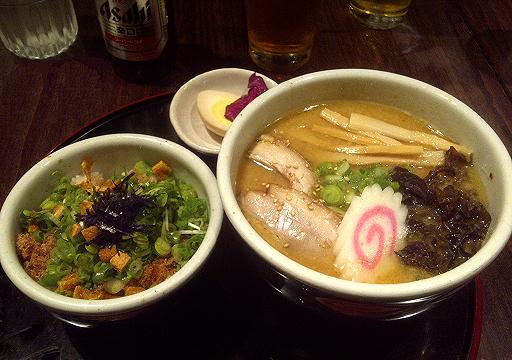
(ramen96.jpg)

(ramen99.jpg)

So, Diane, you wanna eat a famous Japanese ramen, instead of pork meat chop, eh?

Yes, I'd love to.
Okay ... I'll take you to the famous ramen shop on Robson Street in Vancouver.
山頭火 Main Shop in Japan

This shop is in Sapporo City, Hokkaido---the northern island of Japan, isn't it?

Yes, it is. At least, you can feel the atmosphere of the genuine ramen shop.

【Himiko's Monologue】

Well ... It looks tasty, doesn't it?
Which do you like better?
Pork meat chop or ramen?
Personally, I like a bowl of miso ramen.
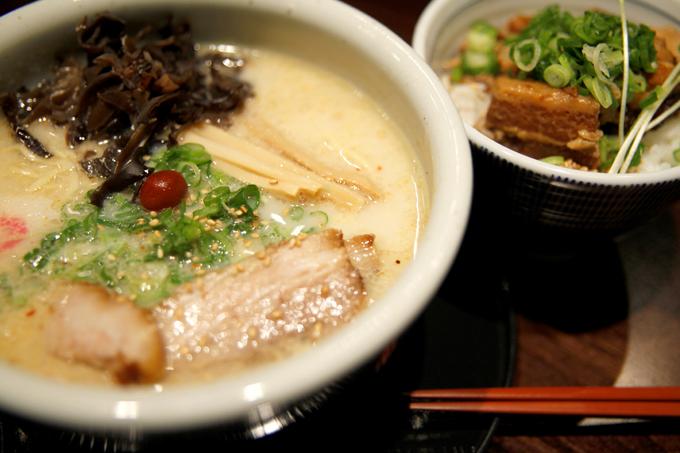
(ramen97.jpg)
Why is that?--- you may ask.
Well, to tell you the truth, I keep myself in this good shape with a ramen-diet.

Am I in a good shape?
You bet on that!
In any case, I hope Kato will write another interesting article soon.
So please come back to see me.
Have a nice day!
Bye bye ...


Well ... It looks tasty, doesn't it?
Which do you like better?
Pork meat chop or ramen?
Personally, I like a bowl of miso ramen.

(ramen97.jpg)
Why is that?--- you may ask.
Well, to tell you the truth, I keep myself in this good shape with a ramen-diet.

Am I in a good shape?
You bet on that!
In any case, I hope Kato will write another interesting article soon.
So please come back to see me.
Have a nice day!
Bye bye ...


If you've got some time,
Please read one of the following artciles:

■"Midnight in Vancouver"
■"Madame Lindbergh"
■"Dead Poets Society"
■"Letters to Diane"
■"Taliesin Studio"

■"Wright and Japan"
■"Taliesin Banzai"
■"Memrory Lane to Sendai"
■"Aunt Sleepie"
■"Titanic @ Sendai"
■"Birdcage"

(sylvie121.jpg)
■"Roly-poly in the wild"
■"Silence is dull"
■"Zen and Chi Gong"
■"Piano Lesson"
■"Dangerous Relation"
■"Electra Complex"

(juneswim.jpg)
■"Covent Garden"
■"Fatal Relation"
■"Notre Dame"
■"Anne Frank"
■"Biker Babe"
■"Diane Girdles the Globe"
■"Diane in Casablanca"
■"Infidelity Neighbourhood"
■"Forest Bathing"
■"Enjoy Ramen!"
■"Sex, Violence, Love"

■"Halifax to Vancouver"
■"A Thread of Destiny"
■"Fujiyama Geisha"
■"Beaver Lake"
■"God is Near!"
■"Holy Cow@Rose Garden"
■"Vancouver Earthquake"
■"Birthplace"

■"KIFF"
■"You Love Japan, eh?"
■"Eight Bridges"
■"First Love"
■"Fright on Flight"
■"Boy's Movie"
■"From Summer to Eternity"
■"Sōseki & Glenn Gould"
■"Dream Dream Dream"
■"In Search of Your Footprint"
■"Little Night Music"
■"Merry X'mas"
■"Happy New Year!"
■"Long live Diane!"
■"Mona Lisa"
■"Flu Shot"
■"Selfish TD Bank"
■"Talk with Mozart"
■"Bliss for Diane!"
■"Romantic Bohemian"
■"TD Bank or Mozart?"
■"Diane@TD Bank"
■"Tear Jerker"
■"Diane in Chorus Line"


Hi, I'm June Adams.
In 1691, Engelbert Kaempfer visited Edo as part of the annual Dutch embassy from Dejima in Nagasaki.
He journeyed from Nagasaki to Osaka, to Kyoto, and eventually to Edo (today's Tokyo).
Kaempfer gives us information on Japan during the early reign of Tokugawa Tsunayoshi ("Dog Shogun").
As the Dutch embassy entered Edo in 1692, they asked to have an audience with Shogun Tsunayoshi.
While they were waiting for approval, a fire destroyed six hundred houses in Edo, and the audience was postponed.
Tsunayoshi and several of the ladies of the court sat behind reed screens, while the Dutch embassy sat in front of them.
Tsunayoshi took an interest in Western matters, and apparently asked them to talk and sing with one another for him to see how Westerners behaved.
Tsunayoshi later put on a No drama for them.

(noplay2.jpg)

ところで、愛とロマンに満ちた
レンゲさんのお話をまとめて
『レンゲ物語』を作りました。
もし、レンゲさんの記事をまとめて読みたいならば、
次のリンクをクリックしてくださいね。
■『愛とロマンのレンゲ物語』

■『軽井沢タリアセン夫人 - 小百合物語』
とにかく、今日も一日楽しく愉快に
ネットサーフィンしましょうね。
じゃあね。






